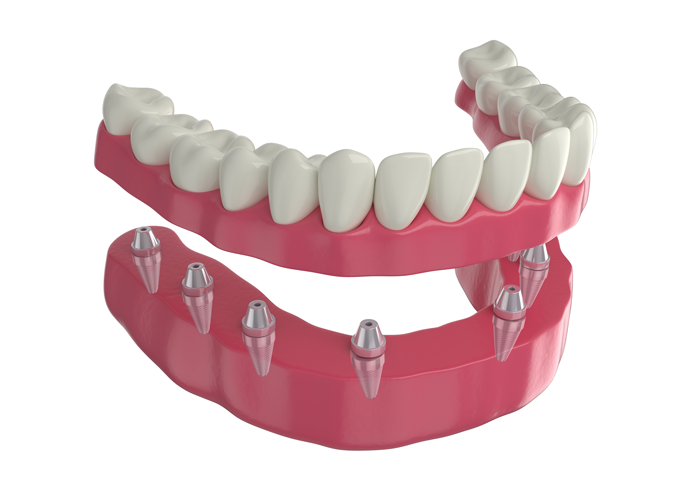While dental care has advanced over the years, many Canadians suffer from tooth decay or loss, causing trauma and pain while making routine activities such as chewing, biting, or simply speaking difficult.
Fortunately, implant-supported dentures (sometimes called snap-in dentures) could be an effective solution since their design not only focuses on improving patients’ appearance but also on functionality. In simple terms, besides helping you feel more comfortable with your smile, they’ll function like natural teeth.
Are you a candidate for dental implants? Do you want to know if this type of denture is for you? Here’s all the information you need!
What is an Implant-Supported Denture?
Teeth maintain the shape of the jaw. Therefore, if their root goes missing, it may begin to soften and shrink. That’s why a traditional denture isn’t always the best option, as it’s often attached on top of the gumline.

However, implant-supported dentures act like tooth roots, helping the jaw maintain its shape and function. They’re embedded into the jaw bone, which prevents it from atrophying.
3 Pros About Implant-Supported Dentures
If you want to know if implant dentures are for you, consider their pros before making a decision. Overall, these are the benefits that these alternatives offer:
Prevent Loss of Bone Density
Unfortunately, bone mass loss and tooth loss can happen at the same time. However, your jawbone depends on the roots of your teeth to maintain its shape and function properly.
Since they function as artificial tooth roots, denture implants can solve this issue by replicating this structure. This reduces atrophy or even prevents the jawbone from deteriorating over time.
Consequently, implant-supported dentures, also known as snap-in dentures, help make biting, chewing, and speaking more comfortable while improving people’s appearance.
Relieve Anxieties About Wearing Dentures
Many people who wear removable dentures experience anxiety about laughing or eating in public because they fear they’ll slip.
However, this doesn’t happen with implant-supported dentures. If you wear these out in public, you’ll feel confident because these embarrassing incidents won’t occur.
Actually, other people won’t even notice a shift or slight movement, which usually happens when wearing conventional dentures. Implant-supported dentures are so secure that you won’t experience speech issues and will never see them slip accidentally.
Offer Enhanced Durability
While there are many types of dentures, these are among the most durable. If you wear implant-supported dentures, you won’t have to restrict your diet to avoid hard foods.
Instead, your chewing skills will be as good as before, so you’ll be able to enjoy your favourite foods without worrying about accidents.
Thanks to the design of implant-supported dentures, which act like your natural teeth and function according to the jawbone’s strength, you’ll have a stronger bite force.
3 Cons About Implant-Supported Dentures
Every rose has its thorn. This means that although implant dentures are great for preventing jawbone deterioration and bone loss, they come with some drawbacks, including the following:
High Price Tag
Overall, implant-supported dentures are more expensive than traditional dentures. As mentioned, they function like natural teeth and offer almost the same strength, but this comes with a cost.
Since the application of this type of denture is more complicated, it’s usually more expensive. However, due to the improved functionality and maximum stability they offer, these options may be more attractive even with a higher price tag.
Longer Healing Process
Once the implant procedure is completed, the time required for the implant’s osseointegration (a direct interface between an implant and bone) into the jawbone ranges from three to six months. Furthermore, this process is strictly necessary.
The implant will only function as it should and survive over time if it’s inserted into the jawbone. This will also ensure that it’s properly secured.
However, many believe that this longer healing process is worth it because they’ll be able to attach the denture and have teeth that function and look like their natural ones after that period.
Jawbone Density Requirement
The jawbone begins to deteriorate as soon as people lose their teeth. If this isn’t treated promptly, it may not be strong enough to support dental implants.
However, if you aren’t a good candidate for using implant-supported dentures due to jawbone deterioration, you can consider bone grafting surgeries. These procedures aim to restore the jawbone, so it can hold the implants.
How to Choose the Right Tooth Replacement Option
If you’re considering tooth replacement, you’ll find two options: dental implants and partial dentures. In order to choose the best one for you, consider the following:
- Your oral health
- If there’s enough bone
- Your budget
- Maintenance requirements
- Aesthetics
Are You a Good Candidate for Implant-Supported Dentures?
A person who has lost more than one tooth but not the full upper or lower set may consider partial dentures. However, dental implants may be a better option for people who need to replace multiple teeth.
Additionally, patients may be good candidates for denture implants if their health is in good condition to undergo the surgical procedure.

Restore Your Confidence in Public With a Natural-Looking Smile!
Shreve Denture Clinic takes pride in offering high-quality implant-supported dentures for people in Leamington, Ontario, who need multiple teeth replacement.

We know that tooth loss can affect your social interactions, work performance, and even your daily tasks, such as simply chewing or speaking.
However, implant-supported dentures provide a stable, firm, and long-lasting tooth replacement and look natural, making them an excellent option for those who have lost many teeth and want to regain their abilities to speak, bite, or just eat. Please Contact Us today for a free consultation.








